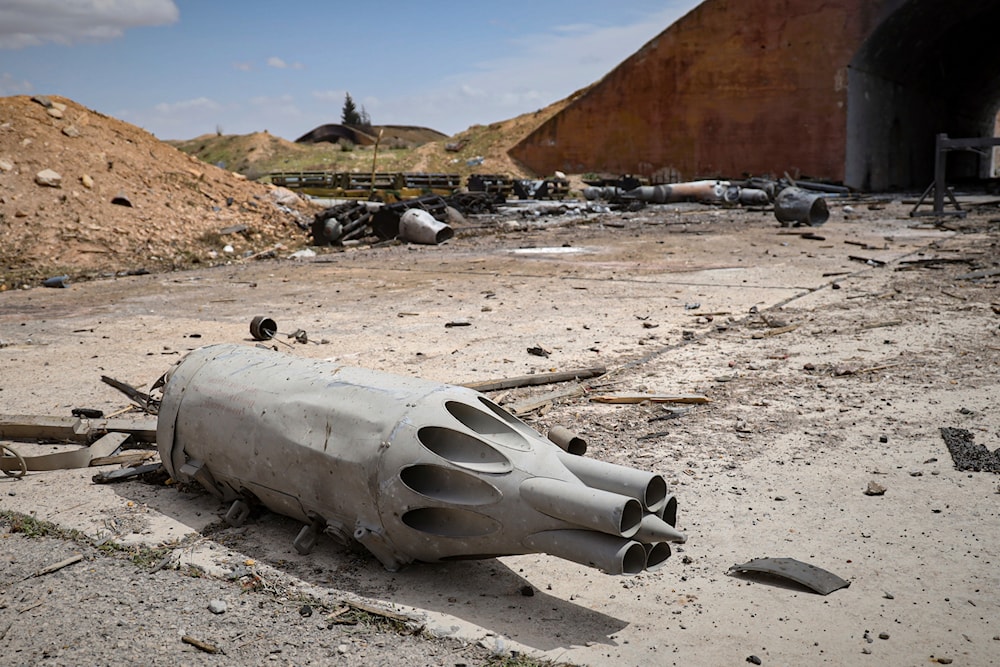Israeli strikes on Syrian bases eyed by Turkey signal regional faceoff
The Israeli airstrikes on Syrian airbases Turkey was scoping out for potential deployment highlight heightened tensions in the region.
-

Debris is scattered at the site of an Israeli strike on a military airbase near Hama, Syria, Thursday, April 3, 2025 (AP)
Turkey had scoped out at least three air bases in Syria for possible force deployment under a planned joint defense pact before "Israel" launched air strikes on the same sites this week, four people familiar with the matter stated, according to Reuters on Monday.
The Israeli strikes on the three sites Turkey was looking into, including a heavy barrage on Wednesday night, came despite Ankara's efforts to reassure Washington that its deeper military presence in Syria, which is part of a possible joint defence pact involving new bases in central Syria and use of Syrian airspace, was not intended to threaten "Israel".
Another planned visit to T4 and Palmyra on March 25 was cancelled after "Israel" struck both bases just hours prior, according to a regional intelligence official and two Syrian military sources.
Strikes at T4 "destroyed the runway, tower, hangars and the planes that were grounded. It was a tough message that Israel won't accept the expanded Turkish presence," stated the intelligence official who reviewed photographs of the damage done by the Israeli attack.
"T4 is totally unusable now," a Syrian source told Reuters.
"Reports and posts regarding developments in Syria - whether real or alleged - that do not originate from official authorities should not be taken into consideration, as they lack credibility and may be misleading," a Turkish Defense Ministry official said when asked about Turkey's visits to the Syrian bases.
"Israel" is "the greatest threat to regional security," Turkey's Foreign Ministry said on Thursday, while Foreign Minister Hakan Fidan told Reuters on Friday that Turkey wanted no confrontation with "Israel" in Syria.
Syria's Foreign Ministry reported that "Israel" launched strikes on five different locations within 30 minutes, nearly destroying the Hama base and injuring many civilians and soldiers, while "Israel" stated that it targeted the T4 air base, military facilities at air bases in Hama and Homs provinces, and military infrastructure near Damascus.
Israeli Security Minister Israel Katz described the airstrikes as a warning, stating, "We will not allow the security of the State of Israel to be harmed," while Foreign Minister Gideon Saar criticized Ankara, accusing it of attempting to establish a "Turkish protectorate" in Syria.
"Israel" is concerned that Turkey could establish Russian anti-aircraft defense systems and drones at the T4 base, "enabling Turkey to establish air superiority in this area," which "poses a serious concern for Israel because it undermines its operational freedom in the region," researcher at the Misgav Institute Noa Lazimi told Reuters.
Turkey tries to reassure US of its intentions
Turkey has attempted to give reassurances to the United States that it is working toward stability in Syria.
Syria's interim President, Ahmad al-Sharaa, would not pose a threat to neighboring countries, Foreign Minister Fidan told US officials during meetings in Washington last month, according to a senior regional diplomat close to Turkey and a Washington-based source briefed on the discussions.
Ankara was carefully calibrating its moves toward a defense pact to avoid provoking Washington, Fidan and other Turkish officials had earlier told al-0Sharaa, according to one of the Syrian military sources.
"Turkey, not Israel, would pay the highest price among regional states were there to be failure or destabilization in Syria, including with refugees and security," an official in the AK Party told Reuters.
Turkey and "Israel" were on an "ideological collision course" but could avoid military escalation through mediation with Washington, Soner Cagaptay, director of the Turkish Research Program at the Washington Institute think tank, said, as cited by Reuters.

 4 Min Read
4 Min Read









